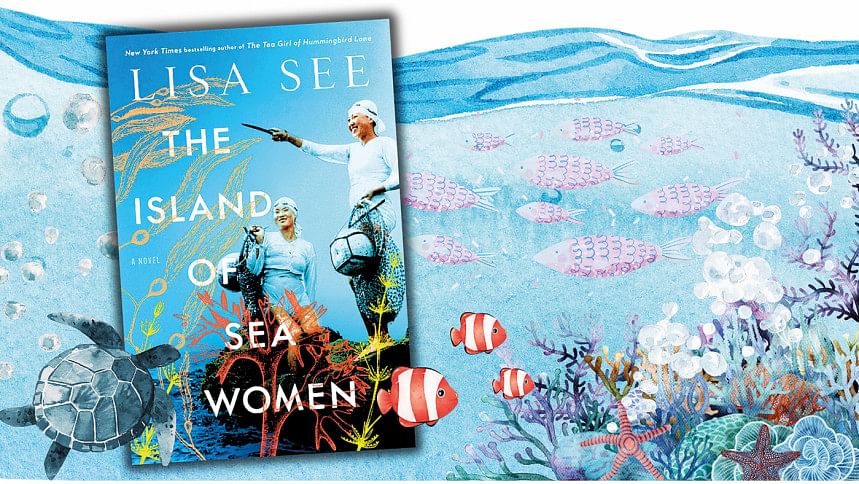Mermaids are real: A story of the Haenyeo

Dear readers. I want you to do something with me. Take three long breaths—as deep as you can. Now hold it for two minutes! How long did you hold? I only survived one minute and 23 seconds. And I'm used to spending time in the water.
Let me introduce the story of women who hold their breath and dive into the depths of the sea without any breathing apparatus—like mermaids. There they hunt and gather the edible treasures going as deep as 20 metres. American novelist Lisa See's historical fiction, called The Island of Sea Women, is about Haenyeos, sea woman. A UNESCO inscribed intangible cultural heritage, Haenyeos comes from an ancient matrifocal society of women native to the Korean Jeju island. Yet the book is about much more.
Personally, this book is significant to me. Spontaneously picked from a bookstore a day before I was leaving for Perhentian, a Malaysian island I was staying on for my scuba divemaster training, I was instantly engaged by the title and words like 'island' and 'sea women'.
The book has many traditional Haenyeo sayings underlying various complex social issues. "When a girl is born, there is a party. When a boy is born, there is a kick to the hip." Females are celebrated for being the sole breadwinner, as well as giving birth to sons - for only a son can do religious rituals and ancestral rites.
However, I only started reading once I was back home, now a certified divemaster and sorely missing water; I opened the book with the hope of reminiscing. "...woman sits on the beach…used to spending time in the water", reading these words was a balm to my soul!
The book circulates around three major themes: female friendship, forgiveness, and history. Very few historical fiction and coming of age stories touch upon complex female characters like this book does. The protagonist Young-Sook's life is intimately intertwined with her friend Mi-ja. Young-Sook's mother foretells this on the girls' first day as sea workers. "Many girls have friends, but the two of you are closer than friends. You are like sisters, and I expect you to take care of each other..." While this sets to disseminate friendship, it also creates a high expectation from it.
The beginning of the story is set during Japanese colonialism and their cruelty in Korea. Mi-ja, the daughter of a late Japanese collaborator, appears brave and outspoken, yet despised by many. Young-sook was the daughter of the Haenyeo chief—loved and respected. From sharing each other's dark secrets, working together in a foreign country, to flirting and having ice-cream with young Russian sailors, the girls grew closer.
The book has many traditional Haenyeo sayings underlying various complex social issues. "When a girl is born, there is a party. When a boy is born, there is a kick to the hip." Females are celebrated for being the sole breadwinner, as well as giving birth to sons. While the birth of a boy means yet another mouth to feed.
The Haenyeos consider the sea better than even their own mothers, "You can love your mother, and she still might leave you. You can love or hate the sea, but it will always be there. Forever." However, the sea is also the place that can be the end for them, "Every woman who enters the sea carries a coffin on her back". As a divemaster and being responsible for the safety of divers, this saying resonated with me the most. Since one cannot breathe underwater, any minor incident can become fatal. This bitter truth is realised when the character who says this breathes her last while being stuck underwater.
Sayings like "It is better to be born a cow than a woman", are used jokingly to express the hardworking life of a woman both as sea workers and in the fields. Most of the men stay home, taking care of children, cooking, and debating about Confucianism under the village tree.
Death, war, and multiple political crises envelop the storyline. "You aren't aware your clothes are getting wet in the rain", is a line from the book that highlights how change comes gradually. After a gruesome tragedy, Young-sook and Mi-Ja's friendship become irreparable and betrayal, disappointment, and anger dominate the later part of the story. Young-Sook achingly recognises, "...I had to hold on to my anger and bitterness as a way of honoring those I'd lost."
However, it seems that Lisa See rushes towards forgiveness and resolution in the end. Relying on the Buddhist saying, "To understand everything is to forgive", and in the hurried introduction of a flat character—like most of the male characters in the novel—a girl named Clara, who comes and helps reconcile Young-Sook with the memory of friendship. Young-Sook lets go of anger and resentment in what seems like a forced reconsideration of everything. While some could say this conclusive self-preservation was necessary, I found the abruptness breaking the suspension of disbelief.
Nonetheless, I would recommend this book to adventurous people, especially women. Not only is this book informative, it is also well researched with an empathetic approach to culture and history. Female solidarity, discourse and laughter without the presence of the male ego, and perseverance through hard work builds the Haenyeo collective. It also shows the strength of women's support systems through grief, disaster, and tragedy.
Jannati Hossain is an entrepreneur, scuba divemaster, marine conservationist, and an avid reader in five different languages. From the mountain to the sea, she has battled to be free.

 For all latest news, follow The Daily Star's Google News channel.
For all latest news, follow The Daily Star's Google News channel. 








Comments